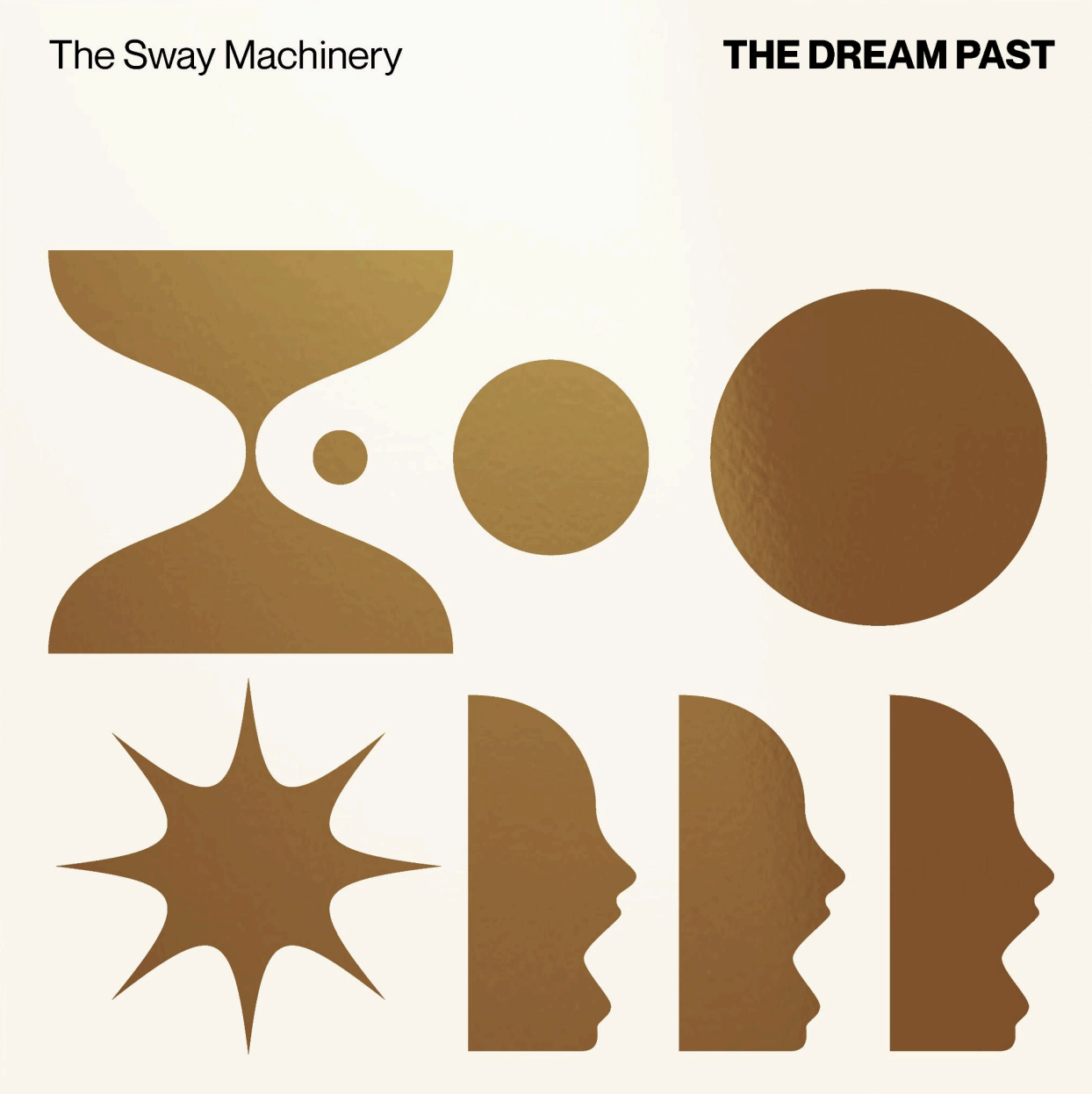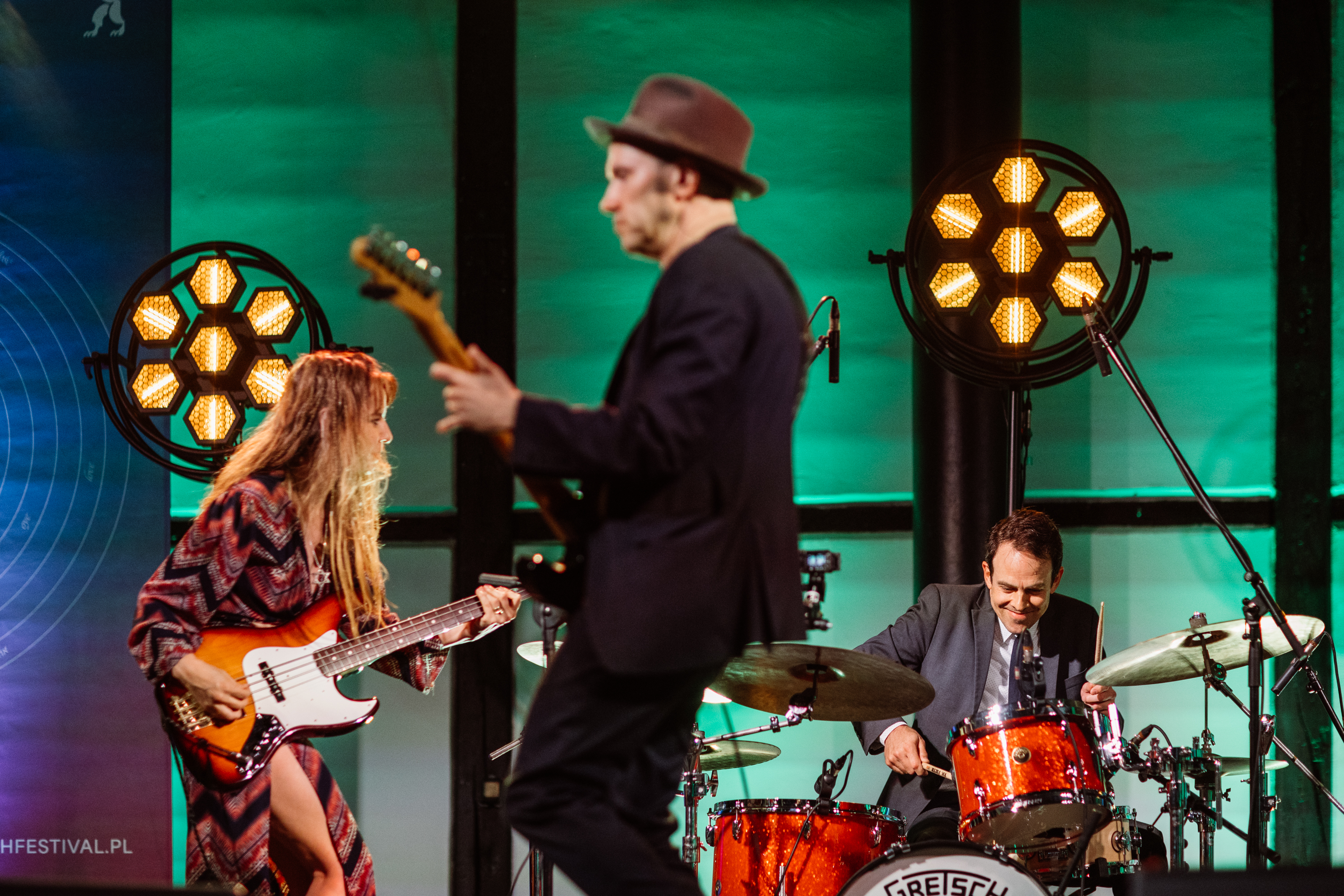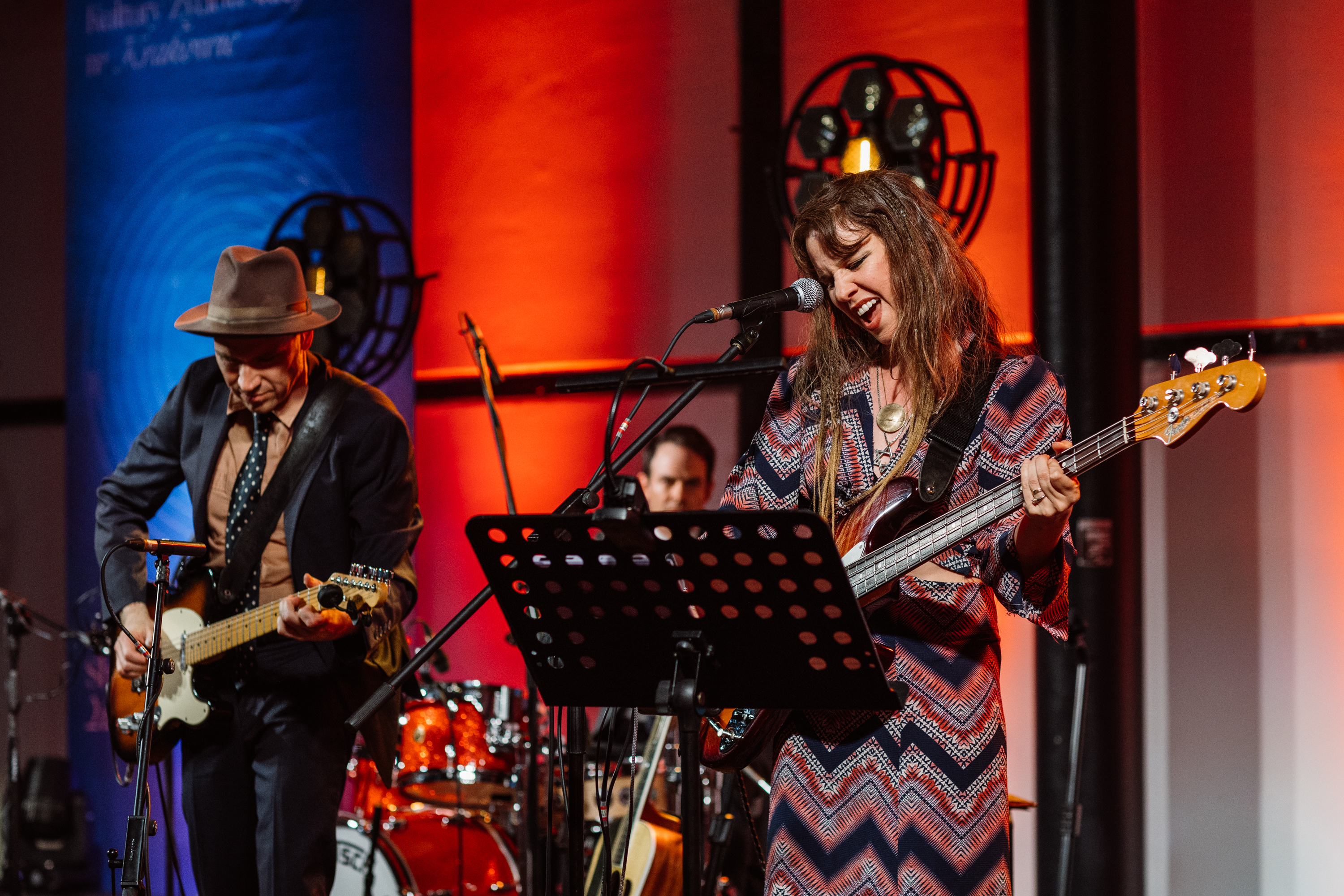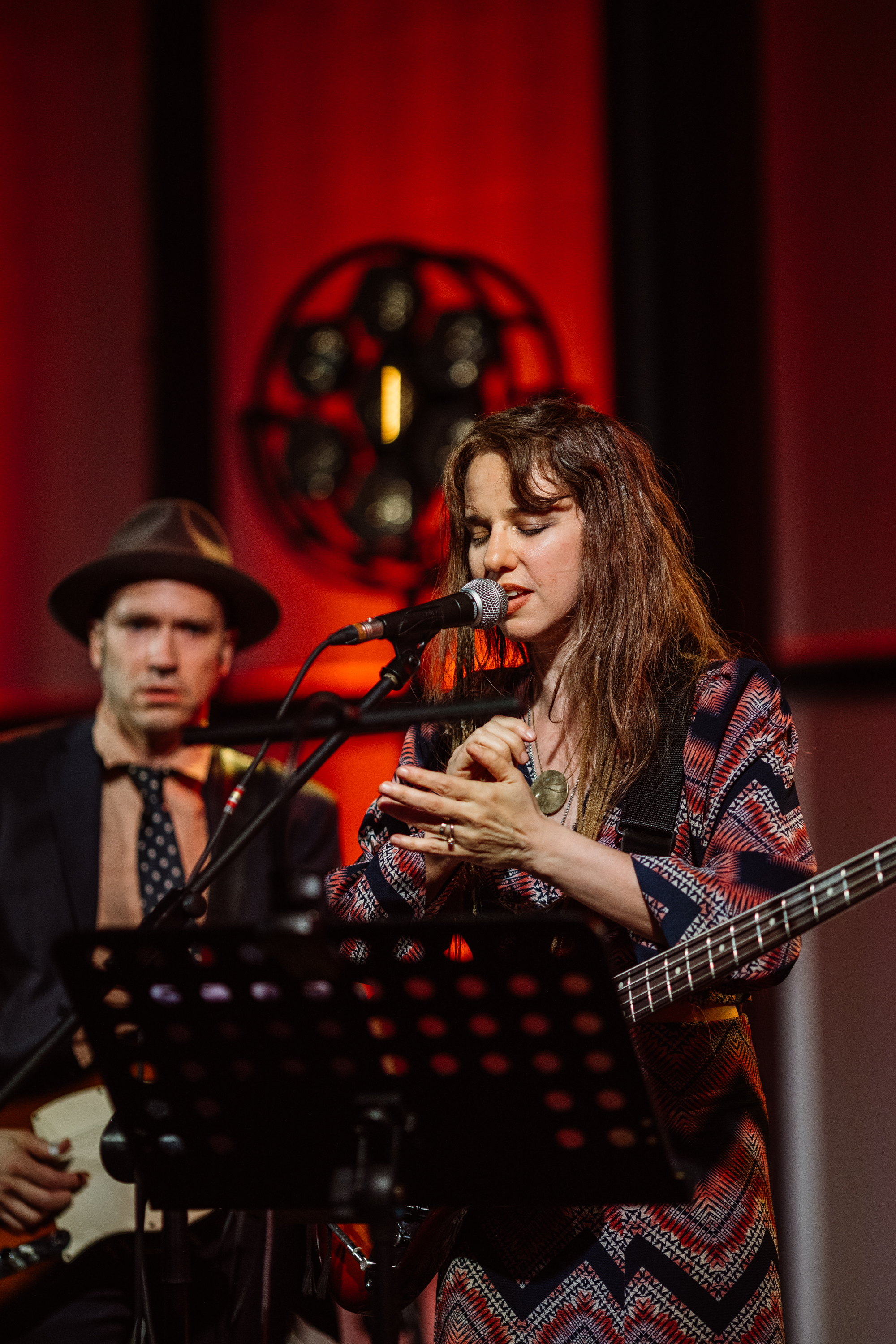
The Dream Past
Buy the album now on vinyl or digital formats
The Sway Machinery
Official release date: December 2025.
Album cover art by Tomasz Jurecki.

Side A
1. Asher Eymosecha
2. Ki Keshimcho
3. Odom Yesodo intro (Sholom Katz)
4. Odom Yesodo
5. V’chol ma’aminim intro (Moshe Ganchoff)
6. V’chol Ma’aminim
Side B
7. Aderes Mamlocha
8. Yishtabach intro (Perele Feig)
9. Yishtabach
10. M’loch intro (Pierre Pinchik)
11. M’loch
12 Shema Koleynu (featuring Jacob Konigsberg)
13 Adon Olam
Produced by Jeremiah Lockwood
Recorded and mixed by Marcin Gągola, Taktik Studio, Krakow
Mastered by Andy VanDette
Design by Tomasz Jurecki
Jeremiah Lockwood - guitar and vocals
Yuli Yael Be’eri - bass and vocals
John Bollinger - drums
Stuart Bogie - saxophone
Kenny Warren - trumpet
Special thanks: the Center For New Jewish Culture generously commissioned the premiere of this music in 2023 under the guidance of Rabbi Matt Green and Cantor Josh Breitzer; Jordan McLean, co-founder of The Sway Machinery played on the original performance; the Krakow Jewish Culture Festival featured The Dream Past in the 2024 festival edition, at which time we recorded this album; all of our families and loved ones; the anonymous “live davening” bootleggers whose audacity in smuggling recording devices into houses of worship produced one of the single most important sources for knowledge of Jewish musical culture.
The Collector
The collector bought his first tape recorder. He believed that with the new machine he would be able to document the fleeting moments that constitute a life. He believed there was another world beyond the wall of the visible and that with this device he would capture the sounds that pierced through the veil. He started his project in the synagogue, recording his favorite cantors. While he sat in the pew with the tape recorder concealed he kept touching his inside breast pocket fearful that his breach of the social contract of the sacred space would be discovered. Despite his fears, he felt himself compelled. He believed there was a clue in this place, in the moaning and throttle of the Jews at prayer, that might prove true his fearful hypothesis.
The collector became a known figure in the great cantorial synagogue. The cantors knew what he was about but looked the other way, perhaps flattered by his attention. The choir members would nudge each other when he got to shul, tittering lightly. The collector’s sense of isolation and paranoia heightened. He felt that he was being watched.
Then one day he saw something startling. When the ark was opened and the Torah taken out something became visible. There was a kind of window at the back of the ark. The collector could see it. On the other side of the ark there was another world: he saw houses, skyscrapers, the sky, the sidewalks glistening with glass shards in the sun, windows, and behind each one a life being lived. A woman in one of the houses in the world on the other side of the Torah ark leaned out her window and cried out, “Look! Someone sees us!”
The collector ran home in a state of shock and ecstasy. At last he had made the contact he had tremblingly anticipated. He couldn’t wait to listen back to the tape. At that very special moment in the recording, rising above the tape hiss, the din of bodies at prayer, and falling mercifully between lines of the cantor’s singing, the woman’s voice could be clearly heard: “Look! Someone sees us!”
The collector became possessed by anxieties and fears. He had found the artifact he desired but now was consumed with dread that he would be found out, that someone or some power would take from him this precious sign and leave him bereft of the evidence that had given his life a breath of meaning. He spent countless hours listening to his tape. Finally wracked by paralyzing fear, he decided to swallow the cassette tape, opening his mouth unnaturally wide and letting the plastic object lodge itself deep in his body.
Eventually the collector died, his body accompanied to the burial site by one or two of his old cronies, stooped with age and frustration. Suddenly a young woman appeared at the graveside wheeling an enormous speaker system. It was the collector’s estranged daughter who had not seen her father in years. She came up to the grave, opened his coffin and stuck her arm down her dead father’s throat, shockingly, gloriously pulling out the cassette, preserved after all these years. She placed the tape in the cassette deck she had brought with her, and pressed play.



Photos by Michał Ramus.
The Dream Past
Liner notes – extended version
1. Asher eymosecha
Text: Eleazer Hakalir (7th century)
Music: JL
The name “Hakalir” refers to cakes or wafers inscribed with names of God that were used to give those who ate them magical knowledge. Eating foods inscribed with sacred texts is a Jewish magical practice that dates back to antiquity; it is described in the book of Ezekiel. In traditional religious schools in the old days, sacred books were smeared with honey after a child’s first lesson so the child could lick the sweetness of the holy word off the page. Asher eymosecha is voiced like a street preacher naming unseen spirits and angels—I make no special claim to understand the words more or less than anyone else. I heard this melody in a dream being sung by a choir of Hasidic men.
Even though you are revered by angels made of ice and fire, your awe upon them,
Yet you desire the praise of men who are made of dust—this is your greatness.
Even though you are revered by roaring hosts of angels, your awe upon them,
Yet you desire the praise of men whose lives fade away—this is your greatness.
2. Ki keshimcho
Text: attributed to Amnon of Mainz (11th century)
Music: Asher Wieder/Kohn family/JL/Yuli Ya’el Be’eri
I learned this melody for Ki keshimcho from the Kohn family of Satmar bal tefiles/khazonim…the piece bears a complex history of transmission…the grandfather of the family learned it as a boy in Hungary singing in the choir of Cantor Asher Wieder (father of the famed Cantor Yehoshua Wieder) before the Shoah. Later Mayer Boruch Kohn reconstructed the piece from his father’s partial memory. Now the piece is sung by Mayer Boruch and his son Cantor Yoel Menachem Kohn who both use it in their high holiday prayer leading. I’m grateful for the flows of history that have allowed me to have access to this fragile lineage.
For as your name, so is your praise, you are slow to anger and easy to pacify; for you do not desire death but that he turn from his evil way and live. And even until his dying day, you wait for him— if he returns, you immediately accept him. It is true, you are their creator, and you know their impulses, that they are but flesh and blood.
3. Odom yesodo
Text: attributed to Amnon of Mainz
Music: Sholom Katz/JL
This piece is based on a bootleg field recording of Cantor Katz made surreptitiously during Rosh Hashanah prayer leading sometime in the 1960s.
Man, his beginning is dust and his end is dust; risking his life, he gets his bread, he is like a potsherd that shatters, like grass that withers, like the flower that fades, like the shadow that passes, like the cloud that vanishes, like the wind that blows, like the dust that flies, and like a fleeting dream.
4. V’chol ma’aminim
Text: attributed to Yannai (6th century)
Music: Moshe Ganchoff/JL
From a bootleg field recording of Cantor Ganchoff during Rosh Hashanah prayer leading sometime in the 1960s.
And all believe that he probes man’s conscience, who redeems from death and rescues from the grave.
And all believe that he is a mighty redeemer, who alone judges all who enter the world.
Who is called, “I am that I am.”
And all believe that he is, and there is none beside him, who remembers those who remember him, remembering them with favor.
And all believe that he remembers the covenant, who apportions life to all the living.
5. Aderes mamlokha
Text: Eleazer Hakalir
Music: JL
The text of Aderes mamlokha is a magic invective from out of the dream life of a prophet. Hakalir rails against the ravaging of innocence and demands cleansing. I wrote the melody in an effort to resolve a conflict in my family but never took the decisive step of singing it for anyone.
The glorious kingdom—why was it overthrown and never restored?
Because they took Baal as their king and followed strange laws.
The mistress will rule over them until angelic glory reigns.
She burned my home and crushed the innocent, yet she remains
She is made wide and long, extending her power
Terrifying the downtrodden, until you return.
6. Yishtabach
Text: prayer book liturgy
Music: Berele Chagy/Perele Feig/JL
Perele Feig was a woman cantor (khaznte) active in New York in the 1950s and 60s, before the advent of rabbinically recognized women cantors in the liberal Jewish movements starting in the 1970s and 80s. Feig was heard in live performance of liturgical music through regular appearances on WEVD, the Yiddish radio station. A bootleg of a radio show captures the vibrancy and physicality of her presence in a manner that is parallel to the documentary qualities of the live davening archive. This rendition of Yishtabach is framed by a suite of melodies I heard performed by an elder Romanian Jewish fiddler, who prefers to remain anonymous.
Praised be your name forever, our king, almighty, the great and holy king in heaven and on earth. For to you it is fitting Hashem, our God, and God of our fathers, song and praise, glorification and hymns, strength and dominion, victory, grandeur, and might, praise and glory, holiness and sovereignty, blessings and thanksgivings, from now and forever. Blessed are you, Hashem, almighty, king great in praise, almighty, of thanksgiving, master of wonders, the selector of song-hymns, you are the king, almighty, life of the worlds.
7. Meloch
Text: high holidays liturgy
Music: Pierre Pinchik/JL
From a bootleg field recording of Cantor Pinchik during Rosh Hashanah prayer leading sometime in the 1960s.
Purify our hearts to serve You in truth, for You are the true God, and Your word is true and enduring forever. Blessed are you Hashem, king over all the earth, sanctifier of Yisroel and the day of remembrance.
8. Shema koleynu
Text: high holidays liturgy
Music: Zawel Zilberts/Jacob Konigsberg/JL
I became aware of the live davening archive that was circulating on the internet after a Shabbos morning service led by my grandfather in the 1960s was posted by an anonymous collector to YouTube in 2012. This recording was a great treasure that was prized by my family. We all sing the shachris kedusha according to the melody my grandfather sang (improvised?) on this recording. Later more recordings of my grandfather’s davening surfaced on file sharing sites. This piece is based on a recording from 1969 of my grandfather leading the Selichos service, offering a unique and improvisatory version of a popular setting of Shema koleynu composed in the early 20th century. The ghost of my grandfather makes an appearance on the record.
Hear our voice, Hashem, our God; spare us and have compassion on us and accept our prayers mercifully and willingly. Lead us back to you, Hashem and we shall find the way back; renew our days as of old. Do not cast us off in time of old age, when our strength fails, do not forsake us.
9. Adon olam
Text: Shlomo ibn Gabirol (11th century)
Music: Belz Hasidic/JL
Based on a recording of Yirmiye Damen, one of the leading bal tefiles in the Belz Hasidic community of Brooklyn.
Master of all things who reigned before creation.
At the time when all was made by his will, then was his name proclaimed king.
And after all things shall cease to be, the source of awe will reign alone.
He was, he is, and he shall be in glory.
He is one, and there is no second to compare to him.
Without beginning, without end, power and dominion are his.
He is my God and my ever-living redeemer, the rock of my destiny in times of distress.
He is my miracle and my refuge; he is the portion of my cup on the day I call.
Into his hand I entrust my spirit when I sleep and when I awaken.
And with my spirit and my body, Hashem is mine, I shall not fear.